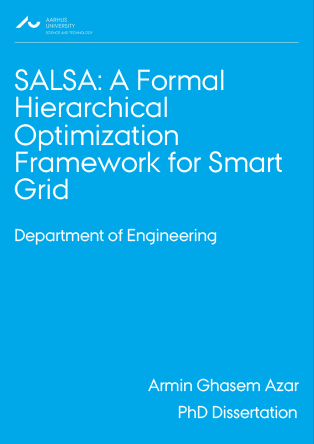SALSA: A Formal Hierarchical Optimization Framework for Smart Grid
Synopsis
The smart grid, by the integration of advanced control and optimization technologies, provides the traditional grid with an indisputable opportunity to deliver and utilize the electricity more efficiently. Building smart grid applications is a challenging task, which requires a formal modeling, integration, and validation framework for various smart grid domains. The design flow of such applications must adapt to the grid requirements and ensure the security of supply and demand. This dissertation, by proposing a formal framework for customers and operations domains in the smart grid, aims at delivering a smooth way for: i) formalizing their interactions and functionalities, ii) upgrading their components independently, and iii) evaluating their performance quantitatively and qualitatively.
The framework follows an event-driven demand response program taking no historical data and forecasting service into account. A scalable neighborhood of prosumers (inside the customers domain), which are equipped with smart appliances, photovoltaics, and battery energy storage systems, are considered. They individually schedule their appliances and sell/purchase their surplus/demand to/from the grid with the purposes of maximizing their comfort and profit at each instant of time. To orchestrate such trade relations, a bilateral multi-issue negotiation approach between a virtual power plant (on behalf of prosumers) and an aggregator (inside the operations domain) in a non-cooperative environment is employed. The aggregator, with the objectives of maximizing its profit and minimizing the grid purchase, intends to match prosumers' supply with demand. As a result, this framework particularly addresses the challenges of: i) scalable and hierarchical load demand scheduling, and ii) the match between the large penetration of renewable energy sources being produced and consumed. It is comprised of two generic multi-objective mixed integer nonlinear programming models for prosumers and the aggregator. These models support different scheduling mechanisms and electricity consumption threshold policies.
The effectiveness of the framework is evaluated through various case studies based on economic and environmental assessment metrics. An interactive web service for the framework has also been developed and demonstrated.

